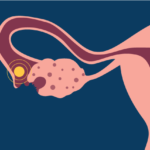The menstrual cycle begins on day 1 of your period and runs until the day before your next period begins! An average regular cycle is typically 28 days, however it can vary between 21 – 35 days.
It is controlled by 4 main hormones,
Estrogen & Progesterone which are produced by the Ovaries, and Follicle Stimulating Hormone (FSH) & Luteinizing Hormone (LH) which are produced by the Pituitary gland.
Follicular Phase:
The first stage of the cycle, which includes the period bleed in the first week. This phase lasts from day 1 of your period until you ovulate (release an egg from ovary)!
The hormones Estrogen & FSH are released during this phase which causes the uterus lining to thicken, and prepares the ovaries for releasing an egg. This follicular phase is ultimately preparing the body for pregnancy.
Ovulation:
This is when the ovary releases an egg. It is typically 14 days after your period begins if you have a 28 day cycle, but can vary depending on the length of your own cycle!
It is around this time that you can become pregnant. Your body will release a surge of LH, FSH & Estrogen just prior to this!
Luteal Phase:
The time between ovulation and the beginning of your next period – approx 14 days, no matter what the length of your cycle!
A little mass of cells called the Corpus Luteum is formed in the ovary just after ovulation and it starts to produce Progesterone predominantly.
One of two things can happen here:
- Fertilisation occurs (pregnancy).
- Fertilisation does not occur and the Corpus Luteum breaks down, levels of Progesterone & Estrogen will decrease which will lead to the onset of your next period bleed.
I hope this helps you to understand your cycle a little better!






